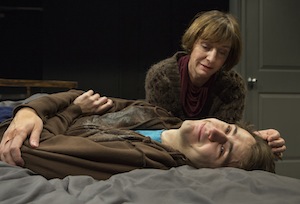
In Terragon’s The Valley, we follow two families, each struggling with emotional demons bubbling to the surface.
In The Valley, we see a play that is very timely, in particular when considering recent events surrounding Toronto police and a TTC passenger. And, given CAMH’s new campaign on the rise of teenage depression, the topic matter allows for reflection, discussion and perhaps family conversations.
Two families, each struggling with emotional demons bubbling to the surface, are unable to properly understand or deal with them until it’s too late. It’s the little signs that develop over time that we sometimes miss or gloss over; or worse, pretend they don’t exist. Slowly they manifest until we can’t put them aside any longer. How and when they do, can be devastating.
As best described in the playbook: “Canadian playwright Joan MacLeod brings her clear and driven signature style to this potent play that explores the unexpected shared lives of strangers. A difficult first few months at university brings the troubled 18-year-old Connor, portrayed by Colin Mercer, back home to live with his mother Sharon (Susan Coyne). The aftermath of his arrest by Constable Dan (Ian Lake) on Vancouver’s SkyTrain, illuminates the young man’s painful mental state, as well as the officer’s fraught home life where his wife Janie (Michelle Monteith), is struggling after the birth of their first child”.
The story is touching, uncomplicated and easy to follow. But what truly makes this piece a must- see is how it’s presented. MacLeod writes the play in such a way that you feel as if you were peering into the lives of these people—a fly on the wall overhearing conversations. As a book, it would function as an overlap of short stories that slowly intertwine as the chapters progress.
As a stage play, director Richard Rose has created a spectacular theatrical event where the audience is gets an intimate look into the character’s environment. Seated around the stage, we are given a glimpse into the private kitchen, bedroom, living room and police station office. We watch as the characters engage in casual conversation making dinner, or changing out of their work clothes into comfy sweats. Even the monologues with the audience can be seen as self-reflection. The first few minutes create an eerie feel that stays with you throughout the performance and the intermission, well, that’s just beautifully done.
The acting itself is also less stagey and more actor workshop. It’s conversations between people that build dialogue that advances the story. No narrator; no vivid hand gestures to tell us where to look; no “theatre”, just honest conversation. All this builds on the overall feeling of voyeurism.
Another thought I had while watching, one that I’ll leave you with, is the overwhelming power of the matriarch. The maternal character played by Susan Coyne, is so well developed and scripted that though the story doesn’t centre on her, she holds the control, the timing and the energy. She also reminds us of the power of maternal instincts to protect and to love unconditionally – such important attributes when dealing with those who suffer with mental illness.
The Valley runs to December 15 in the Mainspace. For tickets, call the box office at 416.531.1827 or visit www.tarragontheatre.com



Leave a Reply